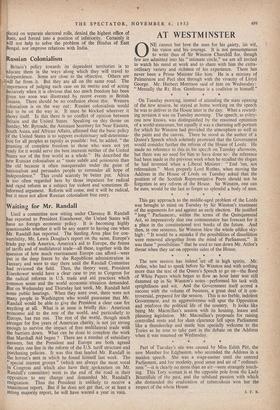Russian Colonialism
Britain's policy towards its dependent territories is to educate them in the ways along which they will travel to • independence. Some are close to the objective. Others are 'Atilt far from it. But they are all on the same road. The ,rnportance of judging each case on its merits and of acting decisively when it is obvious that too much freedom has been given too soon was illustrated by recent events in British Guiana. There should be no confusion about this. Western colonialism is on the way out: Russian colonialism would like to be on the way in. It must be blocked wherever it shows itself. In this there is no conflict of opinion between Britain and the United States. Speaking on this theme on Sunday, Mr. Byroade, the Assistant Secretary for Near Eastern, South Asian, and African Affairs, affirmed that the basic policy of the United States is to support evolutionary self-determina- tion for all peoples as rapidly as possible: but, he added, " the granting of complete freedom to those who were not yet ready for it would serve the best interests neither of the United States nor of the free world as a whole." He described the new Russian colonialism as " more subtle and poisonous than the old because it often masquerades under the guise of nationalism and persuades people to surrender all hope of independence." This could scarcely be better put. Africa is too often regarded here by those impatient for radical and rapid reform as a subject for violent and sometimes ill- informed argument. Reform will come, and it will be radical, but it must not allow Russian colonialism free entry.


































 Previous page
Previous page